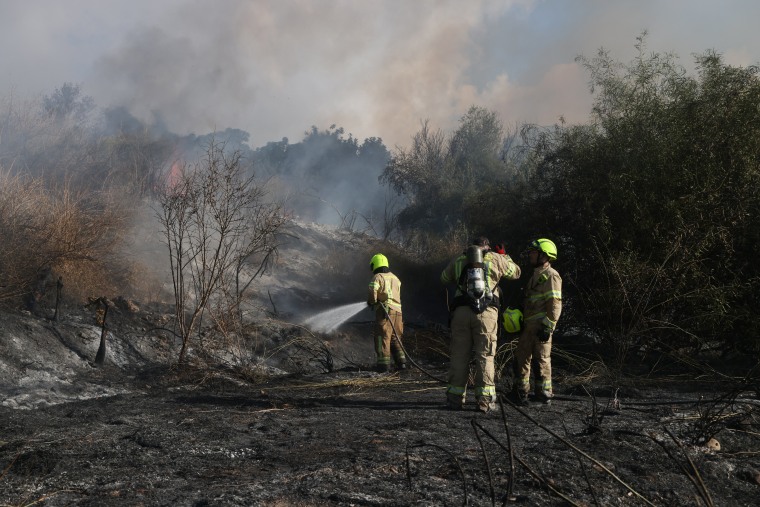Nine people were injured as they ran to shelters after air raid sirens sounded in central Israel on Sunday morning. A ballistic missile launched from Yemen crossed into Israel, landing in an open field outside Tel Aviv, the Israel Defense Forces said.
Israeli Prime Minister Benjamin Netanyahu said Yemen's Iran-backed Houthi rebels, who claimed responsibility for the attack, will exact "a heavy price for any attempt to harm us."
"Anyone who attacks us will not escape from our arms," he said at a Cabinet meeting Sunday.
The sirens, the first in the region in months, included Israel's Ben Gurion international airport in Tel Aviv, where local media showed video of people racing to shelters. The airport's website says it has returned to normal operations.
Video seen by NBC News and verified by Reuters showed a fire in a rural area outside Tel Aviv, with smoke billowing from a crater in the ground as firefighters tackled it.

Other local news reports showed a man taking cover under a table inside a train and images of what appeared to be fragments landing on an escalator of a train station in the town of Modiin, about 20 miles southeast of Tel Aviv.
The IDF said fallen fragments of interceptors were identified at the station.
There were no reports of deaths or serious damage. Israel's emergency services said the injured people were in "mild condition" and being treated at nearby hospitals.
The IDF originally said a "surface-to-surface missile was identified crossing into central Israel from the East and fell in an open area."
It later said that the missile was launched from Yemen and that aerial defense systems made "several interception attempts."
Houthi rebels said in statement Sunday that Israel should "expect more strikes." Sunday's missile covered 2,040 kilometers in 11½ minutes, the statement said, and it was aimed at a "military target" in Jaffa, in southern Tel Aviv.
The group said it would continue strikes in retaliation for Israel's attack on the Houthi-controlled port city of Al Hudaydah in July and to "force the enemy to stop its aggression against the Palestinian people."
“This is the beginning,” Houthi leader Nasr Al-Din Amer told Al-Arabi TV on Sunday.
Israel and Houthi rebels have repeatedly fired retaliatory strikes at each other since the start of the nearly yearlong war between Israel and Hamas in Gaza, but nearly all of them have been intercepted over the Red Sea.
The IDF says initial inquiries indicate the missile “most likely fragmented in mid-air.” But the fact that the missile made landfall at all, despite Israel’s robust interceptors, highlights long-standing concerns that the rebels are swiftly advancing their military capabilities through its connections to Iran.
The U.S. and other governments have long accused Iran of arming, training and financing a network of proxies in Lebanon, the Gaza Strip, Iraq, Syria and Yemen, citing recovered weapons manufactured in Iran and the presence of advisers from Iran’s Islamic Revolutionary Guard Corps.
Iran’s mastery of low-tech warfare has made it a powerful arms dealer, and over the last two years it has ramped up drone production.
In January, a team of Navy SEALs searching a small boat off Somalia found Iranian missile parts bound for Houthi rebels in Yemen, according to the U.S. military.
Iran’s U.N. ambassador, Amir Saeid Iravani, told NBC News in February that Iran is not providing weapons to Houthi forces in Yemen and does not exert control over the militants or other armed groups in the region.
But at least two Houthi strikes have now made landfall in Israel in three months.
In July, a Houthi drone penetrated Israel’s air defense system, hitting an apartment building in Tel Aviv, one block from a U.S. Embassy branch office, killing one person and injuring at least 10 other people.
The IDF said the drone was Iranian-made and modified to fly long distances.
The Houthis say the missile launched Sunday was a “hypersonic ballistic missile” and claim it traveled over 2,000 miles in just over 11 minutes. NBC News was unable to independently verify either claim.
After the July attack, Israel responded with a series of airstrikes on Houthi-controlled areas of Yemen. The IDF has not said whether it has retaliated after the latest strikes.
But each breach of Israel’s borders raises fears that its enemies are increasingly well-equipped and risks further escalation in an already unstable region.